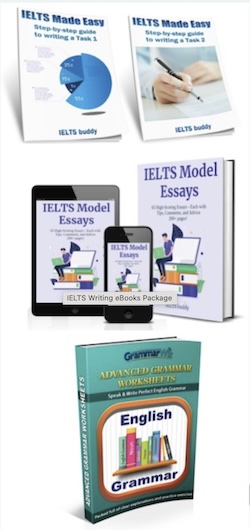- Home
- IELTS Grammar
- Complex Sentences
Complex Sentences for IELTS
Understanding complex sentences and knowing how to write them is crucial for IELTS.
The examiner will not award you above a band 5 for 'grammatical range and accuracy' if you cannot write them or if you have a very limited ability to write them.
You may also be interested in this video on complex sentences for IELTS:

IELTS Marking System for Grammar
This is part of the writing marking criteria for a band 6 for grammatical range and accuracy:
- A mix of simple and complex sentence forms is used but flexibility is limited.
- Errors in grammar and punctuation occur, but rarely impede communication
So you must have a mix of complex sentence forms, though some errors in them are acceptable. If, for example, you learned a couple of complex structures and used the same ones throughout your essay, this would not demonstrate a 'mix'.
In order to understand a complex sentence, you need to understand independent and dependent clauses (look at this previous lesson on clauses if you are unsure what they are).
Note:
It's worth noting at this point that the descriptors also refer to 'complex sentence forms' and 'complex structures'. This is because complex sentences are just one type of complex structure.
There are also other structures such complex noun phrases, nominalisation, and complex verb phrases.
For the higher band scores (i.e. 7 up to ) you will need to be using some of these other sentences forms, not just complex sentences.
Learn more about complex structures.
What are Independent and Dependent Clauses?
A clause is a group of words with a subject and verb. This is a dependent clause:
...because it was raining so hard.
If something or someone is 'dependent' then it needs or relies on something else for aid, support, life etc. For example, a baby is dependent on its mother. Without the mother the baby cannot survive.
In a similar way, a dependent clause cannot 'survive' on its own. It relies on something else. The clause above "....because it was raining so hard" cannot be used on its own as a sentence because it does not make sense.
In order to function, it needs an independent clause. An independent clause can function on its own as a sentence:
I took my umbrella.
This has meaning so is ok on its own. It makes a simple sentence.
If we now join this independent clause with the dependent clause, we have a complex sentence that has meaning:
I took my umbrella because it was raining so hard.
Types of Complex Sentence
Complex sentences have three types:
- Adverbial Clauses
- Relative Clauses
- Noun Clauses
In the following sections, there is a brief explanation of how to construct each of these with some examples. However, they are complicated, so lessons explaining them in more detail will follow later on.
Adverbial Clauses
Adverbial clauses answer questions such as how? why? when? where? They are made by connecting an independent clause and a dependent clause with a subordinating conjunction.
Here are some common subordinating conjunctions that make complex sentences:
|
|
For example (the subject is in green and the verb in blue).:
Some experiments on animals give us the wrong result because animals’ bodies are not exactly the same as our own.
SV subordinating conjunction SV
Some experiments on animals give us the wrong result
------ INDEPENDENT CLAUSE ------
...because animals' bodies are not exactly the same as our own.
------ DEPENDENT (SUBORDINATING) CLAUSE ------
In adverbial clauses, however, it is possible to put the dependent clause before the independent clause. In fact, more often than not, this is the case.
When you do this though, you MUST put a comma after the dependent clause (a comma is not needed when the independent clause comes first):
Because animals’ bodies are not exactly the same as our own, some experiments on animals give us the wrong result.
subordinating conjunction SV, SV
Here are some further examples. Notice how in some sentences the dependent clause comes first, in others it is second. This is your choice:
Even though he arrived late, he did not apologize.
Pollution will get worse if car emissions are not reduced.
While the number of people going to Japan increased, the number going to the UK decreased.
I don't know when he will arrive.
Relative Clauses
Like adverbial clauses, relative clauses are made up of an independent clause and a dependent clause.
However, these clauses have a different use. Relative clauses are used to modify a noun. In other words, to give more information about it.
The relative pronouns who, which, that and where are used to do this, and the relative clause is placed after the noun it is modifying.
For example:
Animal experimentation, which is legal in most countries, should be banned.
Animals experimentation should be banned.
------ INDEPENDENT CLAUSE ------
which is legal in most countries
------ DEPENDENT (RELATIVE) CLAUSE ------
Unlike adverbial clauses, the dependent clause (which is the relative clause) can break up the independent clause - the dependent clause just needs to go after the noun, wherever that is.
Notice also that there are two Subject-Verb combinations. This will always be the case with complex sentences as there are two clauses.
Here are some more examples. The dependent (relative) clause is in red, the independent clause is in bold, and the noun being modified is underlined.
A library is a place where you can borrow books.
Global warming is a problem that must be solved.
Obesity, which is the condition of being overweight, affects millions of children.
A person who breaks the law must face serious penalties.
Noun Clauses
Noun clauses are probably the most difficult to master of the complex sentences, so we'll focus here on the most common and easiest form which you will probably have used many times. We'll look at them in more detail later.
A noun clause answers the question 'who?' or 'what?'. Unlike relative clauses, which come after the noun, noun clauses come after the verb.
For example:
What do you think about corruption?
I think that corruptions is wrong and that those guilty of it should be punished.
In this example, there are two noun clauses, and they are the object of the verb 'think'.
The noun clauses are the dependent clauses because they do not make sense on their own. They need the independent clause "I think...".
I think
------ INDEPENDENT CLAUSE ------
that corruption is wrong
that those guilty of it should be punished
------ DEPENDENT (NOUN) CLAUSE ------
Here are some more examples. The dependent (noun) clause is in red, and the independent clause is in bold:
I agree that capital punishment must be abolished.
I hope that the government intervenes to resolve the situation.
I believe that experimentation on animals is unethical.
It is common to omit 'that' when speaking. For example, we can say:
I believe experimentation on animals is unethical.
However, in formal writing such as IELTS, or academic writing generally, you should include it.
There are further rules and possibilities to use these adverbial, relative and noun clauses, but we will look at them in more detail later.
This lesson provides you with the basics on how they are used.
IELTS and Complex Sentences
To achieve a good score for your grammatical range, you would need to be able to use a mix of these types of complex sentences, and to use them fairly accurately for a band 6, and very accurately for a band 7 or higher.
For band 7 or higher you will also need to try and use these structures in more complex ways, such as reducing your relative clauses and using nominalizations.
We will look at these in another lesson.
Comments
Any comments or questions about this page or about IELTS? Post them here. Your email will not be published or shared.













